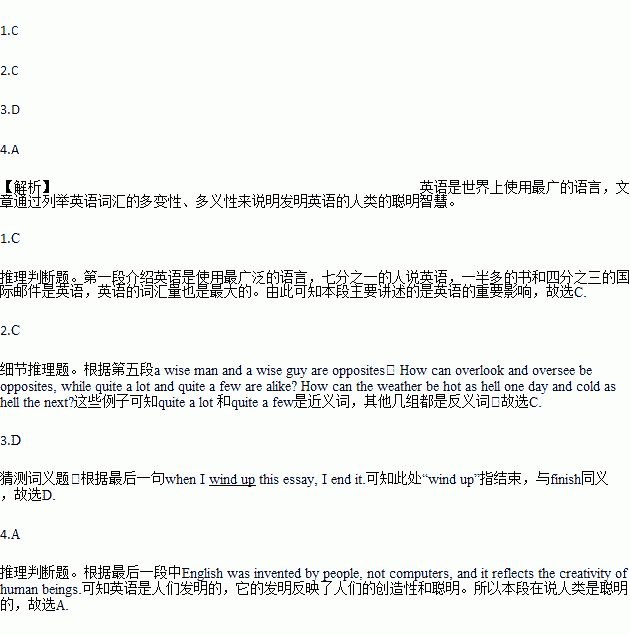题目内容
English is the most widely used language in the history of our planet. One in every seven human beings can speak it. More than half of the world’s books and three quarters of international mail are in English. Of all languages, English has the largest vocabulary--perhaps as many as two million words.
However, let’s face it: English is a crazy language. There is no egg in an eggplant, neither pine nor apple in a pineapple and no ham in a hamburger. Sweetmeats are candy, while sweetbreads, which aren’t sweet, are meat.
We take English for granted. But when we explore its paradoxes(自相矛盾的说法), we find that quicksand can work slowly, boxing rings are square, public bathrooms have no baths in them.
And why is it that a writer writes, but fingers don’t fing, grocers don’t groce, and hammers don’t ham? If the plural of tooth is teeth, shouldn’t the plural of booth be beeth? One goose, two geese--so one moose, two meese?
How can a slim chance and a fat chance be the same, while a wise man and a wise guy are opposites? How can overlook and oversee be opposites, while quite a lot and quite a few are alike? How can the weather be hot as hell one day and cold as hell the next?
English was invented by people, not computers, and it reflects the creativity of human beings. That’s why, when stars are out, they are visible; but when the lights are out, they are invisible. And why, when I wind up my watch, I start it; but when I wind up this essay, I end it.
1.What does the first paragraph mainly talk about?
A. English has a long history. B. English is widely spread.
C. English makes a great difference D. English is used to translate books.
2.Which of the following includes two items that have the similar meaning?
A. A wise man and a wise guy. B. Overlook and oversee.
C. Quite a lot and quite a few. D. Hot as hell and cold as hell.
3.The underlined words “wind up” in the last paragraph probably mean “__”.
A. blow B. roll up
C. get hurt D. finish
4.What does the last paragraph want to show?
A. Human beings are very clever.
B. English is difficult to learn.
C. There are too many words in English.
D. The same words have different meanings.

